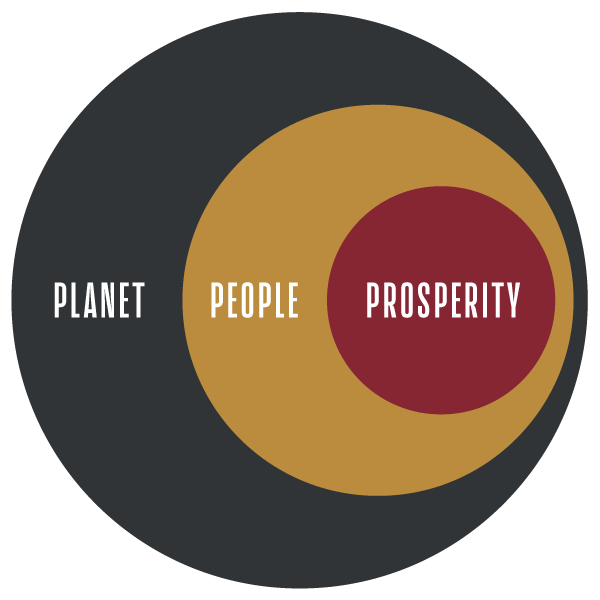- About Ramapo
- Academics
- Admissions & Aid
- Student Life
- Athletics
- Alumni
- Arts & Community
- Quick Links
- Apply
- Visit
- Give
Sustainability Defined
Our Working Definition of Sustainability
We KNOW That Sustainability is WAY MORE than Environmentalism
Although Ramapo College DOES value recycling, we are VERY AWARE that recycling alone is not going to make things right. Environmentalism is NECESSARY–it is very far from being sufficient.
Here’s what “sustainability” means to us, and why we are certain our lives ACTUALLY depend upon it. Not as hyperbole, but as blunt fact. We don’t believe “we” are “destroying the planet”. It will destroy us long before we get CLOSE to destroying it. It is pure hubris to think we CAN “destroy the planet”.
If it was just the environment, we would not need sustainability advocacy. We’d do fine with environmental advocacy.
But when we care about sustainability
we certainly DO care about the environment…!
But we never lose sight of:
Prosperity
People
Planet
Taken Together
Now, and Into the Future…!
This is the frame,
from inside of which,
we believe all choices should be made.
Sustainability broadly reflects the recognition that our actions today affect our prospects for tomorrow, and increasingly, these actions will affect the quality of life and prospects for future generations.
We take sustainability to be an attitude, a world view, a holistic way of thinking about ourselves in the context of the ecosphere. At its heart, sustainability is a reaction to the single-bottom line thinking that undergirds the vast majority of our societal decision making—in that we tend to show an inordinate deference to monetary value, and often disregard the social and ecological costs of our decisions. In this sense, sustainability is about triple-bottom line thinking, a way of making decisions that gives due consideration to profit, people and planet.
A Stricter Bottom Line

Profit becomes a design requirement for the transactional world, but not the objective.
Sustainability requires that those resources which contribute to human welfare be managed such that they are conserved or improved for future generations [1]. Many of the natural resources we consume are finite and non-renewable on human timescales (e.g., fossil & nuclear fuels, minerals), whilst some renewable resources are becoming nonrenewable due to unsustainable use (e.g., fisheries, water, forests, soils) [2,3]. Sustainable development must convert the currently unsustainable practices in industrialized nations to sustainable ones, as well as improve standards of living in developing countries in a sustainable manner [4]. Lifestyles which minimize needless consumption and waste are essential for sustainability.
Ecological sustainability centers on stewardship of resources, ecosystems, the preservation of biodiversity, and natural processes (e.g., ecological succession, microevolution) [5]. A sustainable global economy will be achieved when:
Rates of use of renewable resources do not exceed regeneration rates; rates of use of nonrenewable resources do not exceed rates of development of renewable substitutes; [and] rates of pollution emission do not exceed assimilative capacities of the environment. [6]
Socially, sustainability reflects actions that promote community, relationship to place, cultural diversity, and maintenance of local knowledge, equity, environmental justice, self-worth, and non-violence [7].
Sustainability is a Guiding Principle for Ramapo College:
All strategic goals and objectives must be consistent with the commitment to environmental, social, and economic sustainability by the College. [8]
References
- Kennedy, D. (2007). Sustainability. Science, 315(5812), p. 573. https://doi.org/10.1126/science.1139909
- National Research Council. (2006). Dynamic Changes in Marine Ecosystems: Fishing, Food Webs, and Future Options. Washington, DC: The National Academies Press. https://doi.org/10.17226/11608
- Brown, L. R. (2006). Plan B 2.0: Rescuing a Planet under Stress and a Civilization in Trouble. New York: Norton.
- Holdren, J. P. (2007). Energy and Sustainability. Science, 315(5813), p. 737. https://doi.org/10.1126/science.1139792
- Karlin, E. (2001). Dynamic Aspects of Sustainability. In R.C. Dorf (Ed.), Technology, Humans, and Society (pp. 23–29). San Diego: Academic Press.
- Daly, H. (1996). Beyond Growth: The Economics of Sustainable Development. Boston: Beacon Press.
- Edelstein, M. (2007).
- Ramapo College of New Jersey. Strategic Plan 2007-2012.
Copyright ©2025 Ramapo College Of New Jersey. Statements And Policies. Contact Webmaster.

Follow Ramapo Green